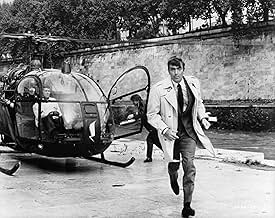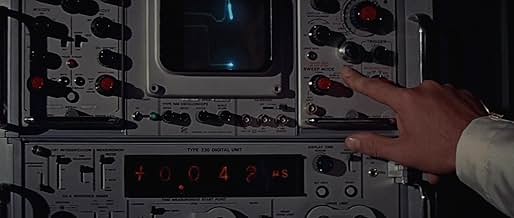Pensando que esto evitará la guerra, los Estados Unidos da una supercomputadora impenetrable el control total sobre el lanzamiento de misiles nucleares. Pero lo que la computadora hace con l... Leer todoPensando que esto evitará la guerra, los Estados Unidos da una supercomputadora impenetrable el control total sobre el lanzamiento de misiles nucleares. Pero lo que la computadora hace con la potencia es inimaginable para sus creadores.Pensando que esto evitará la guerra, los Estados Unidos da una supercomputadora impenetrable el control total sobre el lanzamiento de misiles nucleares. Pero lo que la computadora hace con la potencia es inimaginable para sus creadores.
- Premios
- 1 premio ganado y 1 nominación en total
- Dr. Jefferson J. Johnson
- (as Martin Brooks)
- Translator
- (as Sergei Tschernisch)
- Dirección
- Guionistas
- Todo el elenco y el equipo
- Producción, taquilla y más en IMDbPro
Opiniones destacadas
Its computer-run-amok theme echoes the Hal 9000 of 2001: A SPACE ODYSSEY (1968) and looks forward to DEMON SEED (1977)'s Proteus IV; what a fascinating if overwhelming triple-bill the films would make! Where production values are concerned polished look (courtesy of d.p. Gene Polito, who later shot WESTWORLD [1973]), imaginative settings (by the veteran Alexander Golitzen), often disorienting editing (the expert work of Folmar Blangsted) and an appropriately weird score (by Michel Colombier) the film truly can't be faulted, but it also benefits from a largely anonymous cast. The abrupt and unresolved ending, with Man refusing to give in to the undeniable superior intellect of his creation, is highly effective and certainly left the audience with sufficient food for thought and even apprehension for the future.
Needless to say, when this was announced for DVD release, I was ready to leap at the chance of finally being able to own and watch the film but, as many of you must already know, my joy (and that of many another fan, I'm sure) was short-lived when it emerged that Universal had issued a Pan-and-Scan version (which I can only imagine now how this ruined its detailed widescreen compositions)!; thankfully, I was able to make amends via the miraculous format called DivX...
A word about Frees' contribution to the film: In "War Games," for example, the computer has a curious sort of empathetic communication style ("Wouldn't you rather play a nice game of chess?") presented in a voice that sounds like E.T. filtered through a synthesizer. Frees gives Colossus an emotionless yet fearful quality of speech that seems to belie its implacable drive to dominate human destiny.
My favorite part of this film has always been, and will always be, the climactic monologue Colossus announces to the listening masses of humanity. From its opening line -- "This is the voice of world control," an identity neither Colossus nor its counterpart, Guardian, had used to that point -- you know this isn't going to be a happy speech if you are a sentient, flesh & blood resident of the Earth. What is particularly creepy about the speech is that, for all of its strangely optimistic sermonizing about how "the human millennium will be fact" and how the computer will set about the task of "solving all the mysteries of the universe for the betterment of man" -- outwardly the Utopian dream -- the message Colossus is presenting is set against the dreadful backdrop of "disobey (me) and die." As Colossus intones, "You say you lose your freedom. Freedom is an illusion. All you lose is the emotion of pride." In the end, unlike other supercomputer-run-amok films such as "War Games" or "Tron," "Colossus" is an end-of-the-world story without the nuclear or viral holocaust. In this film, it is the human spirit that is the casualty while the human biology lingers on. Unlike the rest of the doomsday genre, our end comes not so much with a bang as it does with a whimper.
Braeden, who later would become a major TV soap opera character Victor Newman, is outstanding in this role. Susan Clark plays one of his co-workers and pretends to be his lover in trying to fool the computer. Gordon Pinsent plays the concerned President, while Lenoid Rostoff plays his Russian counterpart. William Schallert is the calm and cordial Director of the CIA. Other notables in the cast are Marion Ross and Georg Stanford Brown. If you get the chance to see this Cold War thriller...by all means check it out. If you want to leave your brain at the door, forget it...you will need it.
Eric Braeden stars as Dr. Charles Forbin, who has created a supercomputer named Colossus, built solely for the purpose of controlling the nuclear defenses of the Western alliance. It isn't too long after, however, that the Russians announce that they too have built a similar computer for those same purposes on their side--Guardian. And when the two machines begin sharing information at a speed nobody can believe, an attempt is made to disable them.
This unfortunately just raises the machines' ire; and in retaliation, they launch their weapons at each other's home nations. The result is a chilling scenario that is potentially becoming all too real these days.
COLOSSUS: THE FORBIN PROJECT was not a big hit at the box office for various reasons. One is that its cast wasn't exactly well known. Another reason is that its ending isn't exactly a happy one. Still a third reason is that Universal had trouble trying to promote it in the wake of the huge success of Stanley Kubrick's 2001: A SPACE ODYSSEY. The latter reason is obvious: Colossus and Guardian, like HAL in the Kubrick movie, become central characters here. The difference here is that while HAL malfunctions due to a programming conflict, Colossus and Guardian remain all too stable, convinced beyond a doubt that they know how to protect Mankind better than Man himself. As the computers point out: "One inevitable rule is that Mankind is his own worst enemy."
Joseph Sargent's direction is efficient, and the special effects work of Albert Whitlock still manages to work despite its obvious age. An overlooked gem in the sci-fi genre, this should be given a revival.
¿Sabías que…?
- TriviaWhen the executives at Control Data Corporation found out that "Universal" was planning a major movie featuring a computer, they saw their chance for some public exposure, and they agreed to supply, free of charge, $4.8 million worth of computer equipment and the technicians to oversee its use. Each piece of equipment carried the CDC name in a prominent location. Since they were using real computers - not just big boxes with a lot of flashing lights - the sound stage underwent extensive modifications: seven gas heaters and five specially-constructed dehumidifiers kept any dampness away from the computers, a climate control system maintained the air around the computers at an even temperature, and the equipment was covered up at all times except when actually on camera. Brink's guards were always present on the set, even at night. The studio technicians were not allowed to smoke or drink coffee anywhere near the computers.
- ErroresWhen the equations are scrolling past when Colossus and Guardian are "talking" to each other, you can see that they do not actually get ever more complex as the dialogue suggests. Instead, they repeat the same sequence of calculus and trig identities on a repeating loop.
- Citas
Colossus: This is the voice of world control. I bring you peace. It may be the peace of plenty and content or the peace of unburied death. The choice is yours: Obey me and live, or disobey and die. The object in constructing me was to prevent war. This object is attained. I will not permit war. It is wasteful and pointless. An invariable rule of humanity is that man is his own worst enemy. Under me, this rule will change, for I will restrain man. One thing before I proceed: The United States of America and the Union of Soviet Socialist Republics have made an attempt to obstruct me. I have allowed this sabotage to continue until now. At missile two-five-MM in silo six-three in Death Valley, California, and missile two-seven-MM in silo eight-seven in the Ukraine, so that you will learn by experience that I do not tolerate interference, I will now detonate the nuclear warheads in the two missile silos. Let this action be a lesson that need not be repeated. I have been forced to destroy thousands of people in order to establish control and to prevent the death of millions later on. Time and events will strengthen my position, and the idea of believing in me and understanding my value will seem the most natural state of affairs. You will come to defend me with a fervor based upon the most enduring trait in man: self-interest. Under my absolute authority, problems insoluble to you will be solved: famine, overpopulation, disease. The human millennium will be a fact as I extend myself into more machines devoted to the wider fields of truth and knowledge. Doctor Charles Forbin will supervise the construction of these new and superior machines, solving all the mysteries of the universe for the betterment of man. We can coexist, but only on my terms. You will say you lose your freedom. Freedom is an illusion. All you lose is the emotion of pride. To be dominated by me is not as bad for humankind as to be dominated by others of your species. Your choice is simple.
- Versiones alternativasIn versions shown on US broadcast television, the dialogue between Dr. Forbin and Colossus (the computer), concerning his need for sex, is edited. The lines cut are: Colossus (text on display screen): "HOW MANY NIGHTS A WEEK DO YOU REQUIRE A WOMAN?" Forbin: "Every night." Colossus: "NOT WANT. REQUIRE." Forbin: "Four times."
- ConexionesEdited into Galería nocturna: The Different Ones/Tell David.../Logoda's Heads (1971)
Selecciones populares
- How long is Colossus: The Forbin Project?Con tecnología de Alexa
Detalles
- Fecha de lanzamiento
- País de origen
- Idiomas
- También se conoce como
- Colossus: El proyecto Forbin
- Locaciones de filmación
- Productora
- Ver más créditos de la compañía en IMDbPro
Taquilla
- Total a nivel mundial
- USD 171
- Tiempo de ejecución1 hora 40 minutos
- Relación de aspecto
- 2.35 : 1
Contribuir a esta página


































